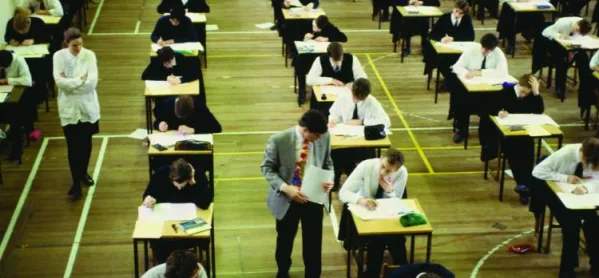Exams regulator Ofqual has published its annual survey of perceptions of the examination system in England, conducted by YouGov, today. Here are five things we have learned:
-
More than two thirds of employers and the public are unaware of 9 to 1 GCSE grading system
The new numerical grading scale - coming into effect this summer for the reformed GCSEs in maths and English - is still not widely known about.
More than two thirds of the general public (71 per cent) and employers (68 per cent) remain in the dark about changes.
That compares with 39 per cent of parents, 16 per cent of young people and just 6 per cent of teachers who are unaware of the new system.
Overall, more stakeholders are aware of the numerical scale compared to a year ago. But the proportion of parents who understand that nine is the highest grade has dropped, from 64 per cent to 54 per cent.
Ofqual has stressed that the survey was carried out in the autumn term before they launched a series of campaign activities to raise awareness.
Michelle Meadows, deputy chief regulator of Ofqual, said: “The current position is likely to be better than reported here, but it still encouraging to see the figures increasing from this time last year.”
-
More than two fifths of heads think marking and appeals review system is unfair
But the survey has found that more than two fifths of headteachers still do not agree that the systems used to challenge GCSE, AS and A-Level results in England are fair.
Parents, young people and the general public strongly agreed that the process was fair - but still more than a fifth of teachers said they thought the system was unfair
Meanwhile, around two fifths of headteachers (38 per cent) and teachers (44 per cent) said they didn’t feel they had enough information about the changes to the marking and appeals system.
-
Only one in ten teachers have heard of the National Reference Test
A new pupil-performance test - which was sat by a sample of year 11 students for the first time in February and March this year - could bring to an end an effective national freeze on significant rises in exam grades.
The National Reference Test (NFT) will, over time, provide an additional source of information that may be used to support the awarding of GCSEs.
But only 12 per cent of teachers were aware of the NRT introduced by Ofqual - and only half of headteachers knew about the measure, which could allow GCSE results to rise again.
Among those who are aware of the NRT, just over a third (34 per cent) of heads agreed that they had adequate information about the purpose of the test.
Ms Meadows added: “We continue to be in period of major reform and many of the systems and processes surveyed in this report are currently changing.
“There will inevitably be a period of bedding in as teachers and schools become more familiar with the changes. This is certainly true of the National Reference Test.”
-
Just over half of parents think AS and A-levels are understood well
Fewer parents (54 per cent compared to 62 per cent) and employers (59 per cent compared to 68 per cent) have agreed that AS and A-levels are well understood, compared to the year before.
Meanwhile, approximately four in five teachers (82 per cent) and parents (77 per cent) felt that AS and A-levels were trusted qualifications - both representing a slight drop compared to last year.
-
But confidence and understanding of GCSEs has gone up
Approximately one in seven headteachers, teachers and parents have agreed that the GCSEs are a trusted qualification - which is a rise on last year.
And around two thirds of parents (65 per cent), teachers (66 per cent) and nearly three quarters of heads (73 per cent) think GCSEs are well understood.
This is despite a vast number of changes to GCSEs. From this year, the first wave of the tougher, reformed qualifications will be sat - with 20 more in 2018 and most others following in 2019.
But fewer heads (56 per cent) and parents (60 per cent) think that GCSEs develop a broad range of skills for students than they did the year before, the findings show.
Want to keep up with the latest education news and opinion? Follow Tes on Twitter and like Tes on Facebook




